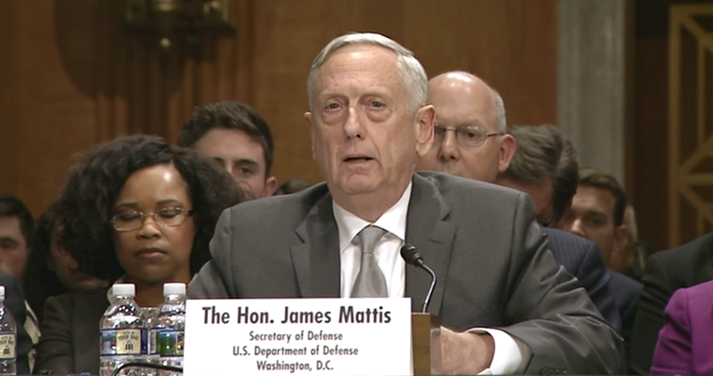
Defense Secretary Jim Mattis testifies alongside Secretary of State Rex Tillerson before the Senate Foreign Relations Committee on Oct. 30, 2017. Screenshot photo.
The Pentagon is warning lawmakers that, while they might welcome a new authorization for its global fight against terrorism, that push must not include repealing the current authorities or restricting the current fight.
Defense Secretary Jim Mattis, speaking during a Senate Foreign Relations Committee hearing Monday evening alongside Secretary of State Rex Tillerson, said the current Authorization on the Use of Military Force is a “sound basis” for ongoing US military efforts. The current two authorizations date back to 2001-02 and were focused on the threat from Al Qaeda, but the evolution of current enemies from that threat means the current authorization is enough.
Monday’s hearing was the third focused on the need for a new AUMF, including a classified hearing in July with both Mattis and Tillerson. Several lawmakers have put forward new ideas for an authorization to use military force against global terror threats, though none have so far gained traction.
Mattis told lawmakers that a “statement of continued Congressional support would be welcome, and a “strong statement to the world of America’s determination.”
A new authorization is needed to “reassert” the legal role of Congress to provide oversight, said committee chairman Sen. Bob Corker (R-Tenn.) This authorization needs broad bipartisan support, to avoid sending “the wrong message” that the country is not united behind its military efforts, he said.
Mattis warned lawmakers that any steps to create a new authorization must not include a repeal of the current AUMF because numerous court cases have shown that it provides adequate authority. Any repeal “would only cause unnecessary police and legal uncertainty.”
Committee ranking member Sen. Ben Cardin (D-Md.) said the current authorization is an “overextension” of authorities, and a new one must be “tailored to current events.” There is “significant” disagreement among lawmakers that current operations are still covered by the original AUMF, though both Mattis and Tillerson said court cases have shown it is adequate.
The hearing focused largely on the ambush in Niger earlier this month that resulted in the death of four US Army Green Berets, and there has to be “more discussion and light” to avoid a global shadow war without scrutiny, said Cardin. He also noted that the current AUMF would not cover possible military action against North Korea, outside of the President’s authority to direct an action in defense of an “imminent threat.”
Cardin, who voted for the original AUMF in 2001, said he had no inclination that it would still be in use 16 years later.
Additionally, Mattis said a new AUMF must not be time-restricted, because that could give an enemy hope that the US doesn’t have “the will to fight as long as necessary.” Lastly, a new authorization must not be geographically constrained because “this is a fight against a transnational enemy, one that does not respect international borders,” he said.
US forces are currently deployed to 19 countries and “can find themselves in combat at any moment” even in locations outside active war zones, Corker said.